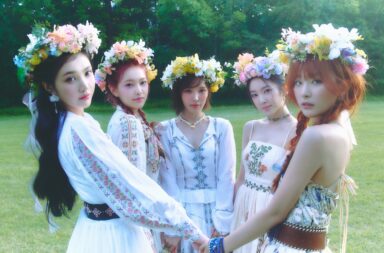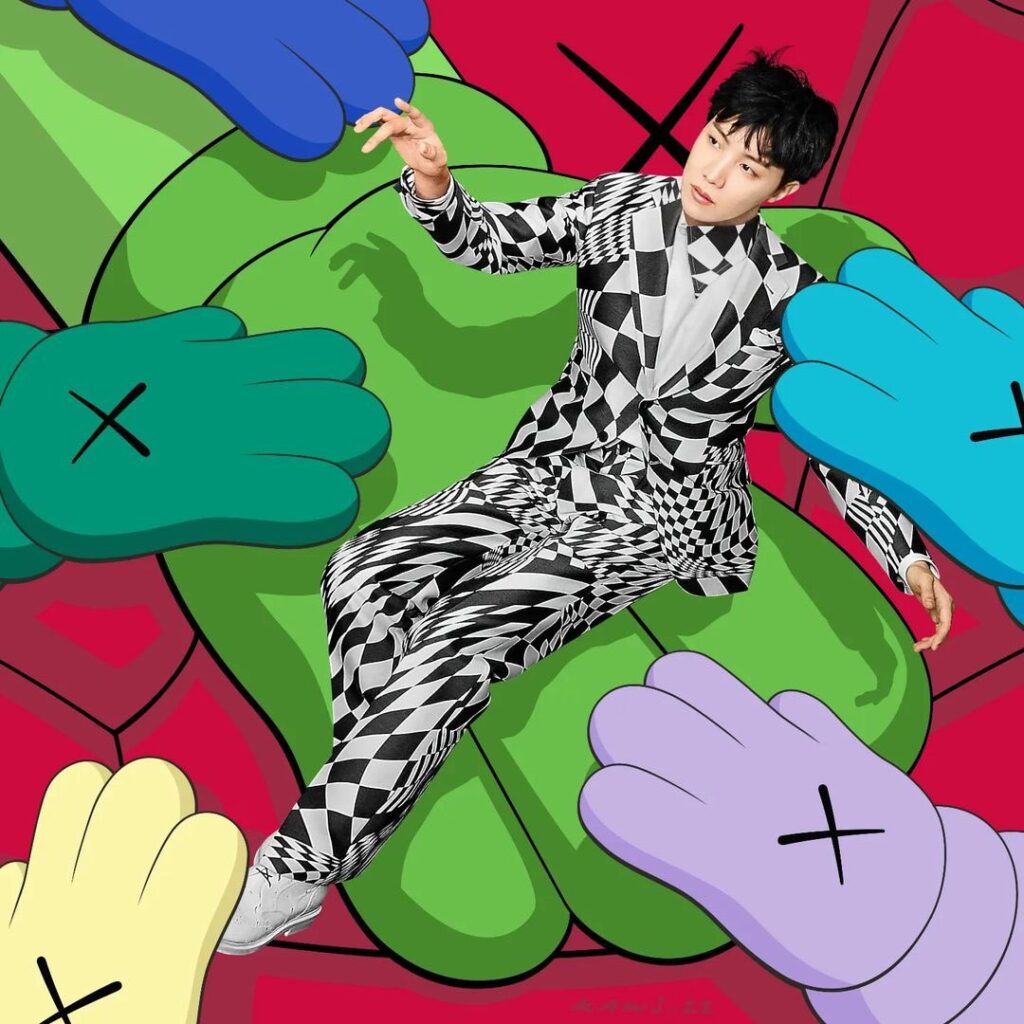
Over a month ago, world superstars and most successful K-pop group of all time, BTS, made waves with their decision to take a break from group activities to focus on solo ventures. The news reverberated through not just the K-pop community but mainstream media worldwide. Hybe’s stock price plummeted overnight, but loyal shareholders will likely be rewarded, because the first album in this new chapter, J-Hope’s Jack in the Box, returns to the Bangtan Boys who were worth our investment in the first place.
The decision coincided with BTS’ ninth anniversary and, critically, followed two years of disappointingly lacklustre output from the once creative group. When the pandemic halted world tour activities for 2020’s Map of the Soul: 7, they decided to focus on increasing their global popularity by releasing what would become their US breakthrough hit, “Dynamite”. The English-language disco-pop track went on to earn them their first US number one – as well as the Grammy nomination they’d always dreamt of.
When “Dynamite” narrowly missed out on a win, they persisted, releasing jovial “Butter” and Ed-Sheeran-written “Permission to Dance”. But in their desperation for the award and outside acknowledgement, they waded into what increasingly became generic, mindless, Western-style pop. The elusive Grammy continued to be out of reach, and for those who observed their progression towards “Permission to Dance”, the reason is obvious. Starting from 2020, BTS’ music began to lose its creativity, sincerity, honesty, and sense of purpose – qualities once their signature traits.
Put simply, it began to lose its soul.
Thankfully, BTS have realised this in the nick of time. After a long wait, the group are now putting their faith back into the raw soul and gut instinct that led them to initial success. Citing a feeling of having lost their way, of not being sure what kind of group BTS are anymore, or what they now want to say as artists, the group expressed they’d take time to (re)discover their artistic identities, through both time off work to themselves and upcoming solo releases from all seven members.
J-Hope’s Jack in the Box is already proof they deserve faith from us as well. Barely a month into their hiatus, the Gwang-ju native has already brought things back to basics, back to the beginning – back to the baseline, if you will.
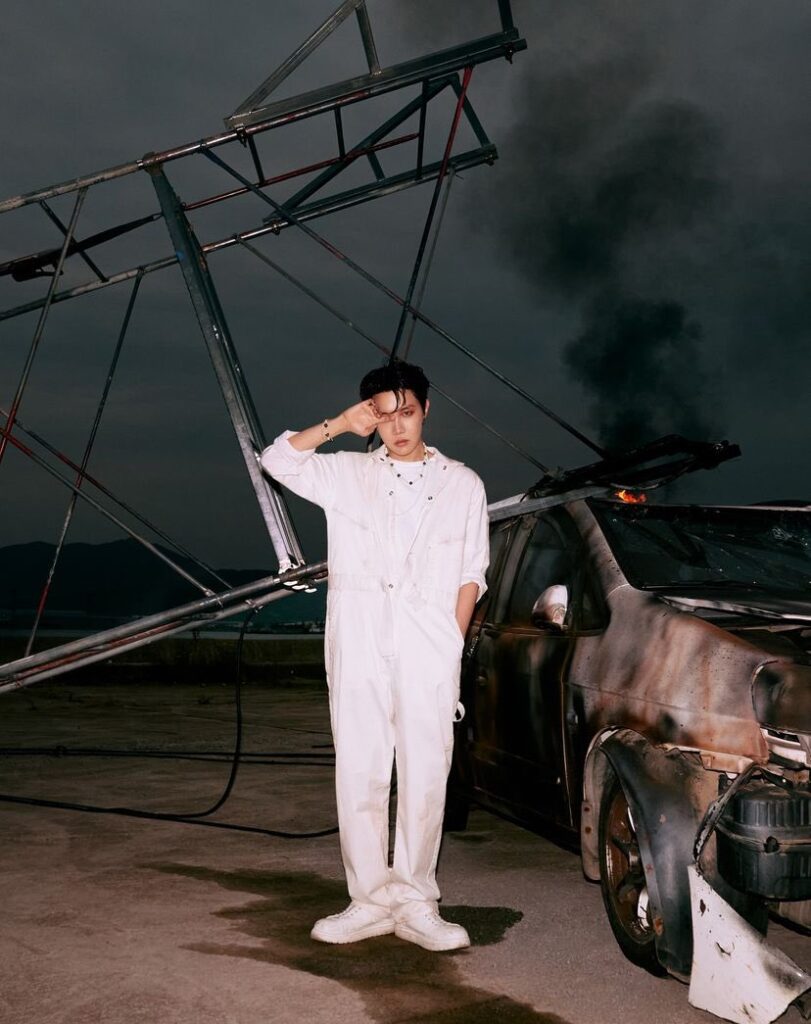
Following 2018’s mixtape, Hope World, Jack in the Box clocks in at twenty-one minutes over ten tracks. This conciseness works to the album’s advantage, as five are built on fairly repetitive 90s-style hip-hop beats. By keeping both individual songs and overall tracklist streamlined, J-Hope delivers the genre’s gritty impact without becoming boring.
More importantly, the album’s dedication to a single early influence is a clear statement of his desire to return to his roots. On Jack in the Box, J-Hope reflects not only on where he came from and who he used to be, but who he has become and who he wants to be moving forward. It explores not just his strengths, achievements, and hopes, but also his flaws, darknesses, and doubts. It’s soul-searching of the exact kind that was ironically rare on BTS’ Map of the Soul trilogy.
The intro retells the story of Pandora’s box, a Greek myth where Pandora opens a box containing everything terrible – pain, disease, war, death, poverty, envy, greed – out of curiosity, irrevocably unleashing them upon the world. Luckily, the box also contains hope, which becomes all humankind has left to hold on to. In “Pandora’s Box”, J-Hope uses the myth to reinvigorate his belief in the power of hope, as well as to revitalise his characterisation as a beacon of hope:
They call me hope
Do you know why I am hope?
Pandora’s history, that’s my birth
The sincerity of the sacred heart given to man by great gods
The ray of light that is left in the Pandora box
Put it into a pure-hearted boy
Till the end, framed to become Bangtan’s hope
The ceremony of fate, knighted in that name
That’s my name
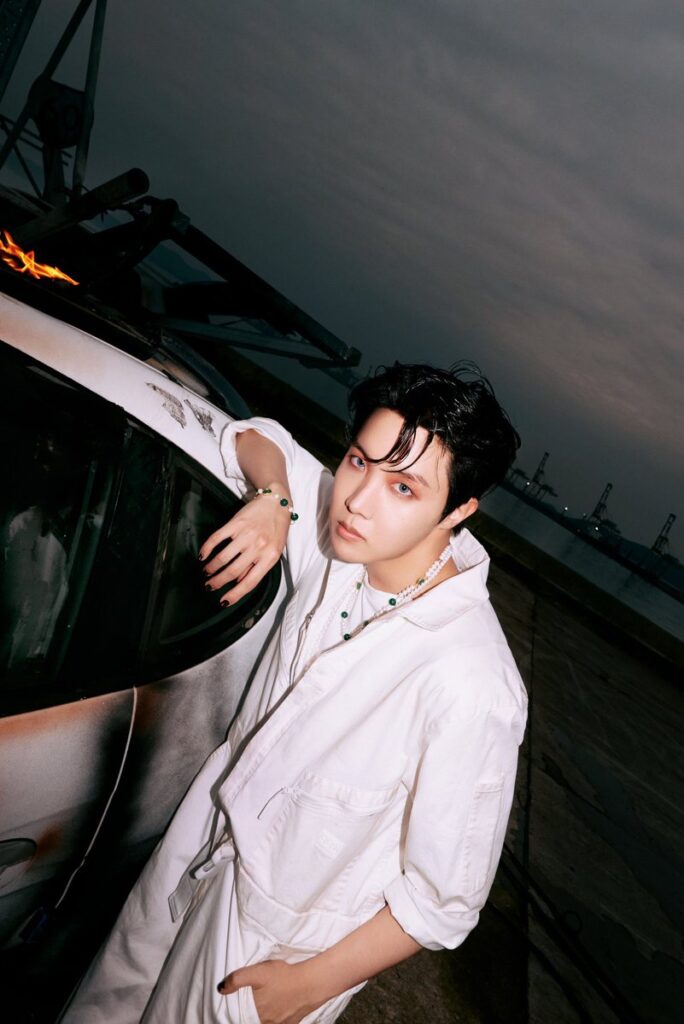
In Hope World’s eponymous intro, where he similarly laid claim to an identity of hope, saying, “My name is my life; A hopeful vibe, a positive rather than a negative type”. The difference is “Pandora’s Box”, and the album at-large, reiterates that positivity without glossing over the concept of negativity. Instead, Jack in the Box is where J-Hope admits he too succumbs to negativity, and the grungy, sinister hip-hop beats (with occasional guitars) reflect how he embraces that darkness within.
In comparison, Hope World was musically and lyrically upbeat, never straying far from the idea he might be anything less than the cheerful, positive boy he seemed to be. In both album, however, hope truly is the final answer to his identity – Hope World championed it as the be-all and end-all of who he wanted to be, while Jack in the Box realises it’s something he must hold on to in order to navigate through the darkness of who he actually is.
“What If…” is an example of this self-reflection in action. Over a sample of Ol’ Dirty Bastard’s (from Wu-Tang Clan) “Shimmy Shimmy Ya”, he directly questions whether the identity he claimed in “Pandora’s Box” and “Hope World” is real or manufactured:
I asked myself dozens of times
Am I really like that?
Hopeful, optimistic, always with a smile on my face
I just thought that was just something I could do
So my music, my speech, my feel
I made it myself
He tells himself to “show [his] persona with pride”, but then wonders, what if he doesn’t actually have the hope, dreams, passion or vision he claims to have? Would he still choose to be that person if he lost his money, house, or car? Questioning his own greed and the real intentions behind his persona, J-Hope essentially asks: is he who he tries to be and says he is? Would he still be that if it didn’t come with the success he currently has?
It’s soul-searching of the highest order, and a moment of humbleness in which J-Hope faces up to his ulterior motives and materialism. In being completely honest, he acknowledges not just his own doubts, but the doubts others may have about him.
This close examination of darkness is echoed in the way he now perceives the world. While songs like “P.O.P (Piece of Peace) Pt.1” expressed his earnest desire to help others and be a “piece of peace”, “Stop” sees J-Hope cast doubt on whether some people deserve to be helped:
Yes, I watch the news
But what’s that?
Deadly criminal, are people really like that?
Actions of humans are worse than brutes
It is so dirty, so foul
I wonder if they call themselves human
He tries to hold on to the belief there are no bad people in the world, but to the end remains in doubt. Clips of American voices saying “Get down on the ground!” and “I need help, I need help” are provocative references to the violence and brutality that’ve filled our newsfeeds over the past few years. It’s immediately powerful and a refreshingly direct piece of commentary on the shocking things which’ve happened that K-pop artists so often avoid referencing.
Still, J-Hope returns to the message of hope when the song rolls effortlessly into “= (Equal Sign)”. It shifts into the major version of “Stop”’s minor key and spreads into a brighter instrumental, making it a clear sequel while also giving “Stop” the space to be its own fully-formed thought. Here he reiterates we’re all the same and urges us to show love, trust, and respect to one another. A little clichéd, but at least it’s earnest.
The rest of the album focuses on J-Hope himself. Pre-released title track, “More” embraces his workaholism, with distorted guitars adding an on-trend punk-rock edge to the boom-bap verses. Instead of questioning why he can’t seem to let himself rest, as on “Dis-ease”, he lets rip his ambition to do, be, and get “more”:
I want it, stadium with my fans, still
Bag all the trophies and Grammys too
Fame, money’s not everything, I already know it
My work makes me breathe, so I want more
Inhale, inhale, exhale, exhale
I feel alive
Meanwhile, “Safety Zone” brings us back to familiar J-Hope territory, with backing vocals crooning a soulful harmony over a relaxed beat. It’s a welcome throwback to 90s R&B, complete with vocal ad-libs from an anonymous feature at the end. Despite consistently emphasising solidarity with his members, the song sees him admit his loneliness – feeling like he has no “safe zone”, nobody he can lean on, and is overwhelmed by life as a busy celebrity in a busy world:
Support from people I trust?
(It’s cold when they turn their backs on me)
The people who led me?
(If I think about it, it’s fear I recall)
Those who share blood?
A sense of duty that cannot be confided
I like animals better than people these days
He begins to address that fear and loneliness on “Future”. On the tentatively optimistic track, complete with a catchy melodic hook, he realises that despite always trying to spread hope to others, in reality he too needs to be able to gain hope from others to face the future. Main title track “Arson” closes the album with a decisive statement of power and success, as well as a look towards what will come next in J-Hope’s career.
Going back to a dark, old-school beat, he arrives at the final track with more conviction, having resolved his self-doubt by realising he needs to accept hope and support from others in order to move bravely forwards. “Arson” is a reminder of what he’s achieved, as well as a resolution to continue burning his passion to light up the world:
It’s done
My dreams, done
Success, done
My part of the job, done
What else, none
Less is more
Leaving when there’s still
Applause, that’s the style
Setting the fire
Is something I did for myself
Who knew the world
Would go up in flames
I see my marks after things cooled down
Fire too big to put out, it was serious arson
Having started out as a street dancer, J-Hope always demonstrated his roots through his love for old-school beats and rap flows that groove in a very dancer-like fashion. However, that influence has never been as explicitly celebrated in his music as it is on Jack in the Box. For both a K-pop idol and mainstream hip-hop-influenced artist, it’s a refreshingly heartfelt tribute to a refreshingly untrendy style – even popular Western and Korean hip-hop artists have overwhelmingly snubbed old-school hip-hop beats for a trap-inspired sound over the last decade.
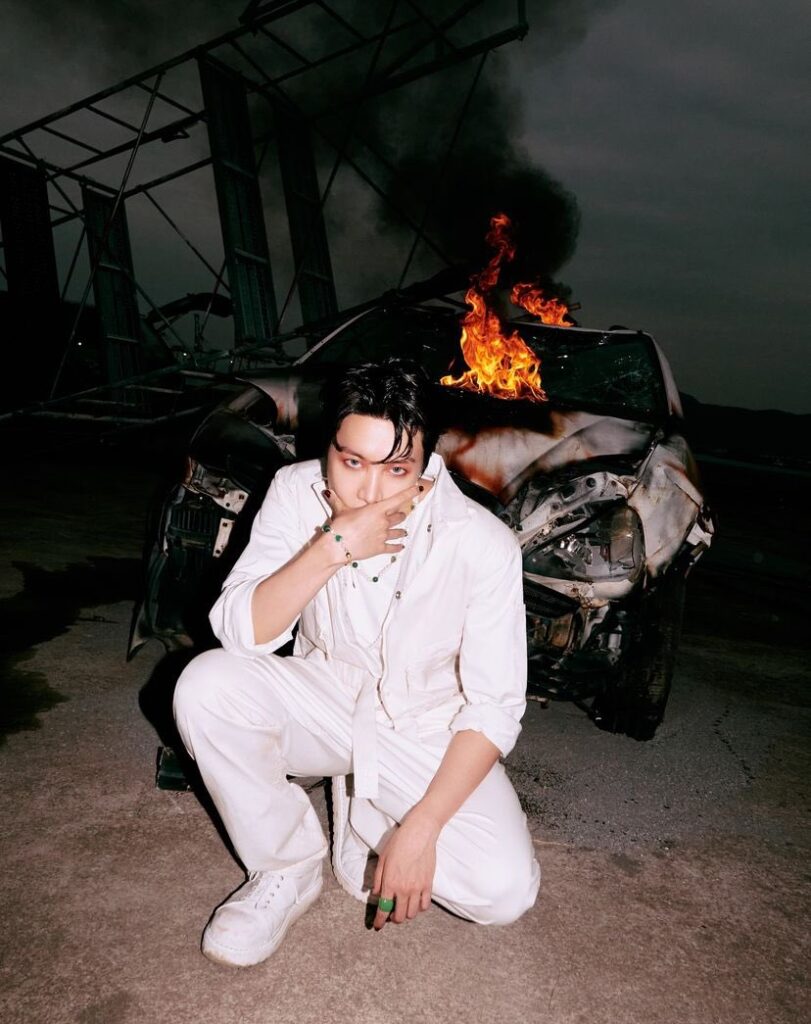
It’s this disregard for what’s trendy, in favour of what feels compelling to him, that makes this album compelling. Likewise, the return to raw honesty and unfiltered self-reflection makes the lyrics so much more compelling than much of BTS’ output of late.
That being said, J-Hope has shown us more interesting and varied rap flows elsewhere before, and his tendency to make hooks out of repeated words mean a lot of the choruses on this project sound similar and overly basic at first. His singing and melody-writing help balance these duller rap moments, and a dedication to groove and danceable rhythms on the instrumentals help keep these songs moving through their short lengths.
More than anything, this album puts into action J-Hope’s and BTS’ brave promise to stop, reflect, and return to their roots, in a situation where everything else is aggressively pushing them forwards. While there may be doubtful voices and tough times ahead as a result, it’s also the best decision they’ve ever made, and Jack in the Box is the beginning of their effort to prove that. Their commitment to artistic integrity, to themselves and to us, makes you want to believe – maybe the best really is yet to come?
(YouTube. ABC News, Billboard, Variety. Lyrics via Genius [1][2]. Images via Hybe.)

